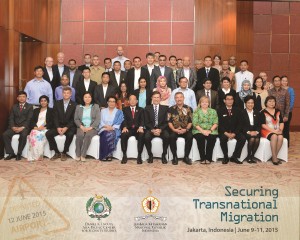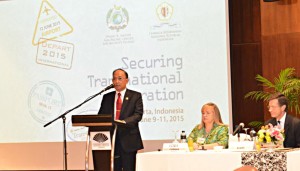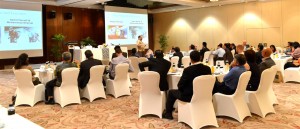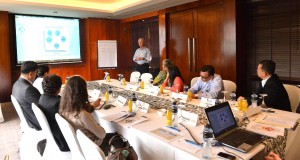
Forty-two people from 10 origin and destination economies attended the June 9 – 11 transnational migration workshop in Jakarta, Indonesia.
Our interconnected global economy, with its tremendous imbalances in workforce demographics and development levels, generates millions of migrants. This situation poses unique security challenges for both origin and destination countries in the Asia-Pacific region.
To address these challenges and cooperation opportunities, 42 people from 10 origin and destination economies, and three international organizations gathered for the June 9 – 11 workshop “Securing Transnational Migration in the Asia-Pacific Region.” The Asia-Pacific Center for Security Studies co-hosted the event in Jakarta, Indonesia, in partnership with Lemhannas RI, the National Resilience Institute of Indonesia.
“Globalization has increased profoundly the flow of labor across national boundaries over the last 20 years,” said U.S Ambassador to Indonesia Robert Blake. “According to the United Nations Economic and Social Commission for Asia and the Pacific there are over 50 million migrant workers in Asia and the Pacific region, or roughly one quarter of the world’s total population of migrant workers.” Blake provided the Jakarta workshop’s opening remarks.

Professor Ir. Budi Susilo Soepandji, governor of Indonesia’s nationalresiliency institute Lemhannas RI, provides comments during the openingceremony of the June 9 – 11 transnational migration workshop in Indonesia. Seated are Dr. Lori Forman, Asia-Pacific Center for Security Studies’
workshop lead, and U.S. Ambassador to Indonesia Robert Blake.
According to the World Bank, over 110 million people are working outside the country of their birth today; these numbers are increasing as is the percentage of south-south migration. The number of migrants from East Asia and the Pacific has increased by nearly 60 percent since 2000. Malaysia, for example, has seen an increase in foreign workers from 380,000 in 1990 to between 2 and 4 million in 2010.

APCSS professor Dr. David Fouse addresses illegal migration and terrorism as part of the “Securing Transnational Migration in the Asia-Pacific Region” workshop.
“The issue of labor migration is critical to the economic security of the Asia-Pacific region. Origin countries rely on money sent home (remittances) to support domestic spending,” said APCSS workshop lead Dr. Lori Forman, “while destination countries rely on imported labor to fill manpower gaps.” Forman cited nearly 30 percent of Nepal’s gross domestic product is derived from remittances. Several Pacific Islands exceed 20 percent, while Bangladesh, Sri Lanka and the Philippines officially post levels around 10 percent. Demographic trends in the region – such as the aging of populations in Northeast Asia – will increase demand for labor to be supplied from other parts of the world.
Workshop participants contemplated how their countries would be impacted if migration ended and migrants had to return to their origin country. The second- and third-order effects would quickly result in a region marked by increased instability and decreased human and national security.
Participants noted that security challenges associated with migration go beyond economics. Improper treatment of workers can strain official bilateral relations between origin and destination countries, increasing tensions in the region. Migrant workers also impact resource requirements and introduce new cultures and behavioral norms in their non-native countries. When most of these workers are lower-skilled laborers, working in low-wage jobs with little protection, these factors can result in conflict with host-nation residents, exploitation, or human trafficking.
“Too often,” said Forman, “migrant laborers fall through jurisdictional cracks. While international conventions, regional protocols and bilateral agreements exist, adding a security perspective to the discussion can contribute to safe and productive migration.”

APCSS professor Dr. James Campbell leads a discussion on issues impacting migration in the Asia-Pacific region during a June 9 – 11 workshop in Jakarta, Indonesia.
Through a combination of topical presentations and group discussions, workshop participants prioritized a menu of actions to address national security issues at organizational, national and regional levels. The group agreed that migration is a national security issue that needs more attention from the combined security community. They also recommended increased inter-agency collaboration and a thorough review of existing migration dialogues to assess their effectiveness and their inclusion of a security viewpoint. Participants also called for more information exchange on migrant flows, and enhanced use of biometrics was cited as an opportunity to improve document security.
Participants emphasized that neither origin nor destinations nations alone can accomplish what is required. Many participants noted this workshop was a unique opportunity for origin-destination interaction. As Forman stated, “Success is found through the mutual deliberation of the subject, joint development of the recommendations, and effective shared governance of the important security issue.”
Blake added, “We are all working toward the same broad goal of comprehensive security…only by working together in a coordinated and integrated fashion can we make progress.”
Participants hailed from Australia, Bangladesh, Hong Kong, Indonesia, Malaysia, Nepal, the Philippines, South Korea, Sri Lanka and the United States.
-END-









Leave A Comment